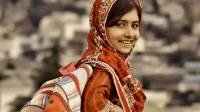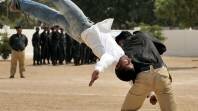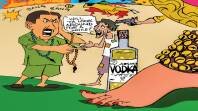She had always amazed me. Malala Yousafzai was only 11 years old when she first met me in Mingora, Swat valley’s main city in the early spring of 2009. At the time, this beautiful valley was under Taliban control and I had entered Mingora after a peace agreement had been signed between pro-Taliban cleric Sufi Muhammad and the government. I had planned a live television show from Mingora on the night of February 18th, 2009.
Just a few hours before the show, our correspondent in Mingora, Musa Khankhel, called me on phone and warned me to be careful because “they” had planned to kill some journalist for sabotaging the peace agreement. I asked him who“they” were and he said he would let me know soon. After a short while, I was informed by one of our cameramen that Musa had been kidnapped and killed by unknown people near the Matta area. Thirty-two bullets had been pumped in his body. I led a protest rally the same evening in front of the Mingora press club with Musa’s coffin itself being carried on the shoulders of some of our friends . We had raised slogans against the assassination of our colleague. That’s from where I remember a little girl with a white shawl on her head who was also raising slogans with us. Her courage had surprised me.
She was Malala Yousafzai. She had joined our protest with her father Ziauddin Yousafzai, who was the owner of a private school in Mingora. After one hour of that protest I was doing a show at 8 pm with the local crowd. Malala was again present in the crowd and she also wanted to speak in my show. Her father told me that Malala also wrote her diary on a BBC blog with a pen name Gul Makai. I advised her not to disclose the identity of Gul Makai and to be careful. But Malala wanted to speak that night. I never stopped her. She only demanded the right of education and expressed hope that her school will be reopened after the peace agreement. She was not only intelligent but also very brave. The Taliban were standing behind her with weapons hidden under their chadars but Malala openly said that she will get education at any cost. She was the star of my show that night. It was her first ever appearance on television.
Unfortunately, the peace agreement never worked in Swat. The Army finally launched an operation in Swat and Malala migrated from her home along with thousands of other Swatis. One day, she called me from Peshawar and surprised me again with her determination. She had said that the Taliban were not defeated in Fata because the local population was not on board but they will be defeated in Swat because local people turned against them. I wrote an article on the optimism of Malala in “The News” on May 8th 2009 and quoted her, “the Taliban will be defeated this time”.
Her prediction came true. Taliban were defeated in Swat. Malala was back to her school by August, 2009.
One day, she visited me in Islamabad with her father. She told me that the children of Swat were facing many problems due to the curfew and security check posts. I invited her again to my show so that she could speak about the problems. She criticized the government policies in the presence of Begum Shehnaz Wazir Ali, who was an advisor to prime minister at that time. Her confidence again surprised me and my viewers. She started getting attention from all over the world. In January 2010, US Special Envoy for Pakistan and Afghanistan Richard Holbrooke visited Swat and he met Malala Yousafzai there. It was the first ever direct contact of US government with Malala. Holbrooke told Malala that the US wanted peace in Swat and his government will give $ 175 million for the rehabilitation of Swat. Little Malala was thankful to Holbrooke and that was why in one of her TV interviews, she appreciated President Obama for his peace efforts. The Taliban were already annoyed with Malala. This interview provided them with an excuse, a lame one albeit, to declare her an American agent. She was threatened; was asked to shut her mouth or leave Swat. She never listened to the Taliban. Her conscience was clear. She was against Taliban because they shut her school. She was also against US drones attacks because many innocent children were killed in drone attacks. She had once asked if we could control the Taliban in Swat, then why couldn’t we do the same in Fata. She was of the view that if we were to control Taliban in our tribal areas then U.S. will have no justification for the drone attacks. These were the kind of statements that angered the Taliban.
The Taliban decided to punish this 14-year-old girl and tried to silence her voice of hope with the bullets of their hatred. When she received threats, she was offered security by the government but she declined. Perhaps she miscalculated the cruelty of the enemy? She thought she was a little girl and Taliban would not attack her. She was proved wrong when a masked terrorist attacked Malala on her way back from school. The assassination attempt was a great shock for the common Pakistanis, specially since the Taliban immediately accepted the responsibility.
What was her crime? She only demanded education. She had already became a symbol of girls’ education before the attack on her life. But it was after the attack that she became a symbol of national. The whole of Pakistan is standing behind her, except, perhaps some mentally sick people who are still living in a state of denial. When I first met her, I never imagined that one day the French media will compare the courage of Malala with Joan of Arc who had led French forces against the English army. I had never thought that the Indian media will declare her the little Rani of Jhansi who had resisted the British Army in 1857. I never expected that one day Madonna will also sing songs in praise of Malala. I felt very proud when an Afghan journalist friend called me from Kabul and said that your Malala repeated the history of Malalai from Maiwand, who had participated in a war against British Army in 1880 near Kandahar. Little Malala gave a new recognition to Pakistan all over the globe.
Now many people are raising slogans that “we are all Malalas”. I disagree with them. We are not like Malala. No political leader, religious scholar, journalist, judge or general showed more courage than Malala in the last three years. Yes, we can praise her. Yes, we can try to use her name for fulfilling our own political and personal agendas but we cannot stand in front of our armed enemy without arms in our hands. We should not make wrong claims. We should not fool ourselves. If we really want to prove that we are all like Malala, then we have to stand up for our rights the way she did. We must stand up against all those who are violating our sovereignty from inside and outside the Pakistan. We must not allow the Taliban to challenge the writ of the state. We must not allow US drones to violate our airspace. If somebody is using our territory for terrorism, it’s our job to stop them, not others. If Malala can stand up against armed non-state actors, why is our state looking helpless, despite all the weapons that it has at its disposal?
The writer is the Executive Editor and senior host of Geo TV.
























